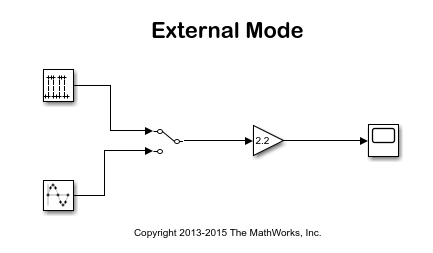Parameter Tuning with External Mode Simulation
This example shows how to run a Simulink® model for the ARM® Cortex®-A processor in external mode.
Introduction
Configure a Simulink® model to run as an external mode simulation. In an external mode simulation, the generated code runs on the ARM Cortex-A9 (QEMU) emulator. External mode enables you to accelerate the design process by tuning parameter values with the model running on hardware and without stopping the model. When you change parameter values from within Simulink, the modified parameter values are communicated to the hardware. The effects of the parameter tuning activity can be monitored by viewing algorithm signals on scopes or displays in the model. For more information on external mode simulation, see Host-Target Communication with External Mode Simulation. For more information on the QEMU emulator, see the QEMU website.
Requirements
Open and Run External Mode Model
1. Open the arm_cortex_a_external_mode model.

The model is preconfigured to use the ARM Cortex-A9 (QEMU) hardware board. For more information on model configuration, see Configure a Model for ARM Cortex-A9 QEMU Emulator.
2. On the Hardware tab of the Simulink Toolstrip, click Monitor & Tune to start the external mode simulation. You can stop the simulation at any time by clicking Monitor & Tune again.
3. After the model builds, deploys, and starts running on the QEMU emulator, you can double-click the Manual Switch block to change the input source. Open the Gain block to change the signal gain. Double-click the Scope block to view the external mode simulation results.
For additional external mode simulation settings, open the External Mode Control Panel dialog box by clicking Control Panel on the Hardware tab.